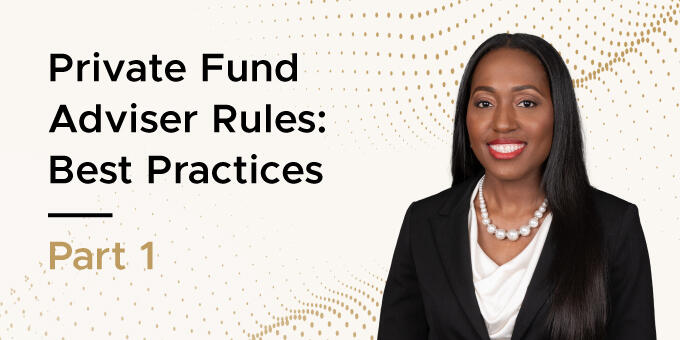Private Fund Adviser Rules: Best Practices | Part 2 - Fund Audits
- Published
- Jul 22, 2024
- Share
Registered investment advisers subject to the annual fund Audit Rule are required to obtain an annual financial statement audit for each of the private funds they advise and deliver the audited financial statements to investors. In this second part in the three-part video series on “Private Fund Adviser Rules: Best Practices,” TaNeka Ray, Senior Manager for EisnerAmper’s Regulatory Risk & Compliance Solutions discusses the SEC audit requirements established by the Custody Rule. TaNeka also provides a list of best practices for investment advisers to follow while preparing for or undergoing an annual audit.
Transcript
Hello, welcome to EisnerAmper's SEC Regulatory Compliance Series. Today, I'll continue to cover best practices to take from the Private Fund Adviser Rules. Let's get started.
Best Practices for Fund Audits
The Annual Audit Rule requires an SEC registered investment advisor who provides investment advice to private funds, to obtain an annual financial statement audit for each of the private funds it advises and deliver the audited financial statements to investors. To satisfy this requirement, the annual audit must meet the requirements established by the Custody Rule. Under the Custody Rule, an investment advisor to private funds is deemed to have complied with the audit requirement if: any such audit is performed at least annually and delivered to investors within 120 days of the private fund's fiscal year; prepared by an independent public accountant that is registered with and subject to regular inspection by the Public Company Accounting Oversight Board, often referred to as the PCAOB; and the audited financial statements are prepared in accordance with Generally Accepted Accounting Principles, often referred to as GAAP.
For a fund that the advisor neither controls nor is under common control, the advisor only needs to take all reasonable steps to cause the fund to undergo an audit that meets the Custody Rule requirements. When selecting an auditor, the advisor should consider whether the auditor has experienced auditing advisors with similar fund structures, and whether the auditor and fund administrator have a history of working together on fund audits, as to make for a more seamless audit process. Now, once the advisor has selected an auditor, the advisor should establish a timeline with the auditor and the fund administrator for the delivery of key deliverables; ensure all requests are fulfilled and provided in accordance with the timeline; provide documentation of accounting policies and implementation of internal monitoring controls; have a valuation policy in place describing the methodology it uses to value its investments; have in place effective monitoring systems to ensure the funds are operating in accordance with its business plans.
To support compliance with the record keeping requirement, advisors should make and retain a copy of the audited financial statements that it distributes to investors, specifically noting the name of each investor, investor's address and the dates of issuance.
That concludes Part 2 of Best Practices to Take from the Private Fund Adviser Rules. Thank you for watching and join me in the next episode in the SEC Regulatory Compliance Series.

Private Fund Adviser Rules: Best Practices Part 1 - Fairness or Valuation Opinions in Adviser-Led Secondaries
Contact EisnerAmper
Ready to take the next step? Share your information and we’ll reach out to discuss how we can help.